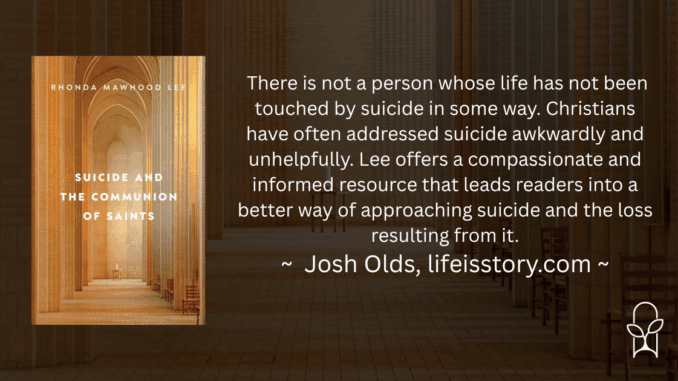
Published by Eerdmans on September 4, 2025
Genres: Non-Fiction, Christian Life
Buy on Amazon
Goodreads

A compassionate vision for living in relationship with those affected by suicide
Rhonda Mawhood Lee is a priest, spiritual director, and daughter whose mother died by suicide. She knows about complicated grief. Having grown up in a family haunted by self-inflicted death for multiple generations, Rhonda has asked and re-asked the questions for which there are no easy answers. And she knows she’s not alone in her search for understanding.
Drawing on her vocational insights and personal experiences, Lee offers a compassionate vision for understanding and responding to suicide. With clarity and candor, she reflects on the unintended consequences of many traditional Christian teachings around suicide. In search of a better way, Lee turns to the communion of saints—a theologically rich concept that Christians can draw on to reframe their relationships with people who have died by suicide, and with those who are at risk of ending their own lives.
Through this sensitive and thoughtful resource, readers will learn what it might mean to stay in relationship with both the living and the dead, bearing witness to hope and faith in God’s creative and redemptive love.
The central question of Suicide and the Communion of Saints is quite simple: What happens when someone we love dies by suicide? Not only in a spiritual sense of salvation, but practically within the life of faith—within the Church, within the communion of saints. Author Rhonda Mahwood Lee reframes the conversation around relationship: How do we remain in communion with those we’ve lost and how do we move forward as a community?
This is an intensely personal book for Lee, who writes out of a long family history of suicide that includes both of her parents. In particular, Lee shares the story of growing up with her mother who attempted suicide several times, finally completing it when Lee was an adult. Lee writes about the pain of that loss but also of the relief of it all and the conflict that came with those competing emotions.
Drawing from Scripture, church tradition, and her own story, Lee paints a picture of divine grace that refuses to give up on anyone. The book unfolds in two parts. The first faces the hard questions: the stigma, the silence, the theological knots that tie up conversations about suicide. Lee traces the history of theological thinking about suicide and what consequences there have been resulting from that. The second turns toward hope, exploring what it means to live as part of a communion that transcends death. Lee’s prose is clear and gentle, her theology grounded in mystery rather than certainty. She writes like a pastor who has learned that not every question needs an answer, but every wound deserves presence.
What makes this book stand out is its balance of mind and heart. Lee never dismisses the seriousness of suicide, but she insists that God’s grace runs deeper than despair. Her vision is neither sentimental nor simplistic—she acknowledges the depth and complexity of it all. At just 160 pages, Suicide and the Communion of Saints is brief, but it lingers. Lee isn’t trying to be exhaustive or comprehensive. She’s simply trying to write through her own experience using her areas of expertise to lead to a place of healing. You’ll find yourself pausing often, not because the prose is difficult, but because the truth it carries asks to be held quietly for a while.
This isn’t a manual for grief. It’s a companion for the journey—one that sits beside you, lights a candle, and whispers, “You’re not alone.” For pastors, chaplains, and anyone who has loved and lost, Lee’s book offers a path toward holy remembrance and renewed faith. There is not a person whose life has not been touched by suicide in some way. Christians have often addressed suicide awkwardly and unhelpfully. Lee offers a compassionate and informed resource that leads readers into a better way of approaching suicide and the loss resulting from it.
